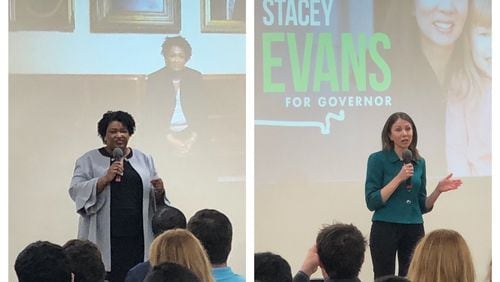The hard-charging folks at the Peachpod political podcast caught up with Democrats Stacey Abrams and Stacey Evans on whether they would revisit a new law that cuts taxes on Georgians by an estimated $330 million over the next half-decade.
Abrams, a former House minority leader, said she would push to reverse the cuts and funnel the extra cash instead into “real programs that would advance economic justice.” Her top priority is expanding Georgia’s Medicaid program, which Republicans have resisted over fears of long-term costs.
Said Abrams:
"Medicaid expansion offers a massive boost to our economy – 56,000 jobs– more than the jobs that are currently offered with Amazon. If we get Amazon and Medicaid expansion, that's more than 100,000 jobs that could be coming to the state of Georgia. Our willingness to invest in one and not invest in the other shows a wrongheaded approach to what we should be doing in the state. My intention is to make certain that we're investing and lifting up all Georgians, and not simply focusing on our favorite ideas."
Evans, a former state lawmaker, told the podcast she wouldn't try to reverse the tax cuts.
“Any time we can give tax relief to Georgians, we should. But we have to be really responsible,” said Evans. “Because Georgia’s government does have things it needs to pay for.”
But she said she would seek the $250 million or so initially needed to expand the Medicaid program by searching for unnecessary spending in the budget.
Said Evans:
"I happen to think there's a lot of waste in the budget. Every year we look at the budget, we just see the new money. We don't look back at the dollars allocated five, 10, 20 years ago in all instances. And there's a lot in the budget that is no longer being spent efficiently throughout our departments in the state. And I want to take a full top-down look to see where the dollars are going and to make sure we're allocating those most efficiently to do all the things we know that government needs to do."








